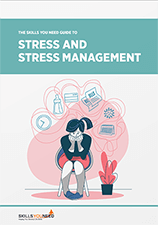Relaxation Techniques - Learning to Relax
See also: MindfulnessIt is hard to find time to relax. Most of us would probably admit that we do not spend enough time relaxing and recharging our batteries. We are always too busy rushing from place to place, getting work done, and managing homes and families.
However, the opposite of relaxation is tension, or stress. If you do not give yourself time to relax, you will end up feeling increasingly stressed. Your productivity will drop, both at home and at work. You will probably become even more stressed as a result. This is likely to have knock-on effects on your health and your relationships, as well as your ability to work. You need to make time to relax.
This page explains the importance of relaxation and provides some ideas for ways that you can change what you do to help you relax. It also describes some simple relaxation techniques that you may find helpful.
Balancing Stress and Relaxation
In biology, muscles that are working are known as tense or stressed muscles. When they stop working, they are known as relaxed.
The same goes for people: the opposition of stress or tension is relaxation.
We all understand that it is impossible to tense and work your muscles constantly. They become fatigued after a while—a surprisingly short time for some muscles—and you have to relax for a bit before you can use those muscles again. The same applies to us as individuals.
We can all manage a certain amount of stress, although the precise amount varies between individuals. However, once we have been subject to stress, we need to relax and recharge before we can take any more stress.
The amount of relaxation required will vary depending on the level of stress, and the time you were exposed to it. It will also depend on you as an individual. However, as a rule of thumb, you need to balance stress and relaxation in your life.
A Word of Warning
In today’s busy, stressful world, we have become programmed to think that all stress is bad.
However, that is not necessarily the case. A reasonable amount of stress is not bad for us: it can be both motivating and energising.
It is possible to be too relaxed and laid back as well as too stressed. People in this state may miss opportunities, and also find it harder to remain motivated.
The key is to balance stress and relaxation to optimise life experiences, remain healthy, achieve more and reach our potential. To do this, we need to listen to what our bodies and minds are telling us and learn how and when to relax.
- See our page: Emotional Intelligence for more information about how you can learn to listen to your emotions and the emotions of others.
- See our page: What is Stress? For more information about the symptoms and triggers of stress.
Tips to Help You Relax
There are many ways in which you can relax, including specific relaxation techniques like meditation. However, it may also be worth making some bigger changes in the way that you live and work, as a way to find a better work–life balance.
For example:
1. Try Not to Worry
Not worrying is often easier said than done. However, it is worth trying.
The Serenity Prayer, adopted by Alcoholics Anonymous, may provide a useful way of thinking about things that worry you.
God, grant me the serenity to accept the things I cannot change, the courage to change the things I can, and the wisdom to know the difference.
Reinhold Niebuhr (1892–1971).
“Accepting the things you cannot change” is a good way to stop yourself from worrying too much. This is particularly true of things that have already happened. Try to avoid dwelling on your past mistakes. Instead, simply make a mental note of what you will or would do differently in the future.
It can also be helpful to try distract your mind by taking part in an activity that keeps your mind busy, such as making something, or doing a puzzle. The simple act of smiling can also help to lift your mood, release tension and ease difficult situations. You can therefore deliberately do something that will make you laugh, such as talk to a friend, watch a comedy or read an amusing story. You may not feel totally happy but by smiling and laughing you will naturally release tensions and feel more relaxed. Laughing is a powerful stress-reliever (and see our page: Laughter Therapy for more about this).
2. Take Control of Your Life
One of the most stressful situations is feeling that your life is out of your control: that other people are making all the decisions for you.
Spend time thinking about who is in control of your life, and if necessary, take back control of some of it. For example, develop your assertiveness, and start to say ‘no’ when you think that someone is asking too much. See our pages on Assertiveness for more about how to do this.
The section on Self-Coaching in our page on Coaching at Home suggests that you should think of yourself as the CEO of your own life. Don’t let your ‘shareholders’—your boss, your children, and your partner, for example—control everything for you. Consider how much control you want them to have, and how much you want.
Everybody has strengths and weaknesses, and it is good to be aware of yours. However, don’t punish yourself for them. Instead, learn to use your strengths and accept your weaknesses. In particular, don’t set yourself unrealistic goals that challenge too many of your weaknesses all at once. This will help you to remain more confident and positive. See our page Self-Motivation for more about this.
3. Stay Fit and Healthy in Both Mind and Body
It is a well-known fact that exercise, in whatever form, is useful for stress relief and aiding relaxation.
Go for a walk or swim, run up and down the stairs, put some music on and dance, or punch the air around you—whatever your tastes, find an appropriate form of exercise, and get into the habit of doing it regularly.
See our page The Importance of Exercise for more information.
However, your body is not the only thing that needs exercising. Stress can also be caused by boredom or under-stimulation of your mind. If this is the case, learn a new skill, take up a new hobby, join a local group or society, or play board games: find something to do that stimulates your mind. There is more about this on our page on keeping a healthy mind.
There are more ideas about how to reduce stress in our page: Dealing with Stress.
Learning to Relax: Some Basic Relaxation Techniques
There are many different relaxation techniques available. It is likely that one or more will suit you better than others, or at different times, so finding out what works for you or in certain situations is important.
Most of the time our minds are focused on external influences—the things that are going on around us and in our lives. The fundamental principle of relaxation is to focus our attention back on ourselves. This enables us to become more aware of our inner tensions and work on relieving them.
Breathing to relax
Breathing deeply and regularly is a very good way to calm yourself. It is also a good way to relax, because it is quick and simple.
Start by taking a slow deep breath in, through your nose if possible. Try to draw it right down to your stomach. Breathe out slowly through your mouth. Repeat this ten times.
This is worth doing a couple of times a day, or any time you start to feel stressed. It slows you down a bit and helps you to stay calm.
Progressive Relaxation
In this technique, you work your way around your body, tensing and relaxing each part in turn.
Step 1. Start by lying down somewhere comfortable and firm, like a rug or mat on the floor or a firm bed. If at any point during this technique you feel pain or cramp then stop. Get yourself comfortable.
Step 2. Relax and try to let your mind go blank. Breathe slowly, deeply and comfortably, and slowly and consciously relax all your muscles, one by one.
Step 3. Start to work around the body one main muscle area at a time, breathing deeply, calmly and evenly. For each muscle group, clench the muscles tightly and hold for a few seconds, then relax it completely. Repeat, noticing how it feels.
Do this in turn for each of your feet, calves, thighs, buttocks, stomach, arms, hands, shoulders and face.
Step 4. When you have finished going round the body, just lie still for about 10 to 15 minutes. Remember to get up gently, because you can feel a bit funny after you have been lying down for a while.
Alternatives
For a quicker alternative to progressive relaxation, you can also try clenching your whole body whilst standing, and then consciously relaxing. This may be more convenient at work or in other, more public, places. The results are not quite as satisfying, but it can help to relieve tension. You can also try massaging muscles that feel particularly tense, especially those in your neck and shoulders.
For more specific relaxation techniques, you may be interested in reading our pages on:
- Mindfulness - Focusing on the present through meditation.
- Aromatherapy - The therapeutic use of essential oils and their scents.
- Self-Hypnosis - Relax your mind to induce a gentle, relaxing trance.
- Laughter Therapy – How laughter and laughter yoga can help you to relax and relieve stress.
- Music Therapy - The power of music, how listening to music can help you relax.
Further Reading from Skills You Need
The Skills You Need Guide to Stress and Stress Management
Understand and Manage Stress in Your Life
Learn more about the nature of stress and how you can effectively cope with stress at work, at home and in life generally. The Skills You Need Guide to Stress and Stress Management eBook covers all you need to know to help you through those stressful times and become more resilient.
In Summary
For many people, controlled and conscious relaxation is not part of their routine. It is, however, important to learn how to relax and take time to relax throughout your life.
Conscious relaxation using one or more of these techniques or others can help to relieve stress and anxiety. Other lifestyle changes, such as taking more exercise, or learning to say no to demands can also help to reduce stress and make you feel more confident, creative and productive.


